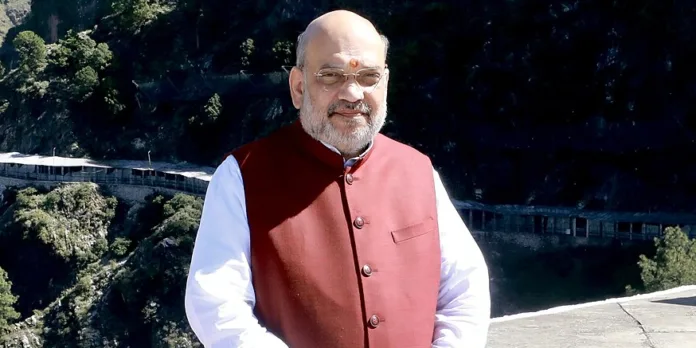Union Home minister predicts BJP victory, blames Rahul Gandhi for congress’s decline in political standards
Union Home Minister Amit Shah expressed confidence in the BJP-led National Democratic Alliance’s (NDA) victory in the Lok Sabha Elections 2024. In a recent interview, Shah asserted that the government, under Prime Minister Narendra Modi, will return to power. According to Shah, the NDA has already secured the necessary numbers to form the government in the first five phases of the general elections.
“We are somewhere between 300 and 310…this is minus the last phase,” Shah told the Indian Express. He highlighted the BJP’s 10-year track record and 25-year agenda as key factors in their electoral success. He stated that the party is in a comfortable position and ready to continue its governance.
Embed from Getty ImagesShah acknowledged the importance of a strong opposition in the country. However, he emphasized that the electorate ultimately decides the composition of the opposition. “Yes, I accept that, but it’s the people who will decide. We cannot create it. It cannot happen because you wish it to happen,” Shah remarked.
He elaborated on the concept of a “Congress-Mukt Bharat,” clarifying that it refers to ridding the country of the Congress party’s ideology. “But even that (ideology) isn’t there (in the Congress) now,” he said. Shah criticized Congress leader Rahul Gandhi, holding him responsible for the decline in political standards. “In my opinion, it’s after the entry of Rahul Gandhi in the party that the Congress’s behaviour has changed, the standards of politics have fallen after that,” Shah commented.
Shah further explained that this shift in the Congress party’s conduct has influenced its allies’ attitudes, impacting the broader political landscape. He dismissed any notion that the opposition’s weaknesses reflect on Prime Minister Modi’s mission for the nation. Instead, he listed various achievements under Modi’s leadership, such as improving the living standards of 60 crore people over the past decade.
Shah credited Modi with empowering citizens through initiatives like housing, sanitation, clean water, health insurance, food security, and access to gas cylinders. “Modiji has helped build self-confidence and self-determination,” he said. Shah also praised Modi’s swift response to the COVID-19 pandemic, noting that the Prime Minister’s decisive actions and use of technology protected 132 crore people. “Elsewhere, even in advanced nations, the fight against Corona sputtered because there the government fought while here the government and the people fought together,” he added.
The sixth phase of polling concluded on Saturday, covering 486 of the 543 Lok Sabha seats. The BJP-led NDA is aiming for a third consecutive term with a target of winning 400 seats. In this election, the ruling alliance faces a challenge from the opposition parties, united under the Congress-led INDIA bloc.
Analysis:
Amit Shah’s assertions reflect the BJP’s confidence and strategic positioning as they head into the final phases of the Lok Sabha Elections 2024. His comments underscore several critical elements influencing the current political landscape in India.
Politically, Shah’s remarks highlight the BJP’s sustained efforts to project strength and continuity in governance. By emphasizing a decade of achievements and a forward-looking agenda, the BJP seeks to consolidate its support base and appeal to undecided voters. Shah’s critique of Rahul Gandhi and the Congress party aims to undermine the opposition’s credibility, framing the BJP as the more stable and effective political force.
Sociologically, Shah’s emphasis on the government’s achievements in raising living standards addresses the broader public’s aspirations. Programs focusing on housing, sanitation, health, and food security resonate with large segments of the population, especially the economically disadvantaged. This narrative reinforces the BJP’s image as a pro-poor, development-oriented party, crucial for securing votes from these demographics.
Economically, Shah’s highlighting of the BJP’s welfare schemes underscores the party’s focus on inclusive growth. By showcasing tangible benefits like health insurance, food grains, and gas cylinders, the BJP positions itself as a facilitator of economic empowerment. This approach not only addresses immediate needs but also aims to build a loyal voter base appreciative of the government’s efforts to improve their quality of life.
From a local perspective, Shah’s comments about the Congress party and its alliances touch on regional political dynamics. By criticizing Rahul Gandhi’s leadership and the behaviour of Congress allies, Shah seeks to weaken the opposition’s unity and question its capability to govern effectively. This strategy aims to sway regional leaders and voters who might be on the fence about supporting the Congress-led alliance.
In terms of gender and minority perspectives, the BJP’s welfare schemes have significant implications. Programs that provide housing, sanitation, and food security can disproportionately benefit women and marginalized communities. By improving access to basic necessities, these initiatives can enhance the socio-economic status of vulnerable groups, contributing to gender and social equity.
The theoretical perspectives relevant to this story include theories of political behaviour, public policy, and governance. Shah’s emphasis on welfare programs aligns with the notion of responsive governance, where the state addresses citizens’ needs to build legitimacy and support. His critique of the opposition reflects political behaviour theories, where framing and narrative play crucial roles in shaping public perception and electoral outcomes.
Overall, Shah’s remarks encapsulate the BJP’s election strategy of showcasing achievements, discrediting the opposition, and appealing to diverse voter bases. As the elections progress, these narratives will continue to shape the political discourse and influence voter decisions.
